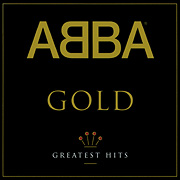
Gold [Greatest Hits]
ABBA
1992: Polar Music International AB 314 517 007-2
My position on ABBA is complicated. Certainly I’m not an ABBA fan—no question about that: too much of their material strikes me as being formulaic cheese, and just a whiff of certain tracks is enough to make me gag in recollection of Euro Disco’s worst excesses. But then there are the tracks for which I bought a copy of this album (and probably others that weren’t hits—I don’t know about that), which have some interesting quirk or unexpected angle, whether lyrically or musically. And I’m sophisticated enough to appreciate the difference between a song that seems bad because of a garish recording and a song that actually is inherently bad, and in that sense I can sometimes acknowledge the songcraft of ABBA…and sometimes I still have to say “Damn, that’s schlock.”
So what are the ones that made me buy this? Probably “Does Your Mother Know” and “S.O.S.” alone. “Knowing Me, Knowing You” and “Take a Chance on Me” aided the sale by being somewhat fond memories from my late childhood, although on the whole I don’t really like either song so much as the recordings’ impressions (especially of course the iconic opening to “Take a Chance on Me,” which remains striking all these years later). “Gimme! Gimme!” (etc.) and “Voulez Vous” grew on me a bit after I’d bought the CD, but neither is what I’d call profound on any level (“Voulez Vous” in particular is an exemplar of that Euro Disco cliché). Why “Waterloo” didn’t make the cut for this album, I do not know, because it’s about as ABBA as you can get (which is to say “catchy and corny at the same time and redolent of ’70s Euro pop music style, albeit admittedly the best of that genre).
Thanks to The Adventures of Priscilla, Queen of the Desert, in the mid 1990s I (and everybody else) was given an ABBA refresher course, and I’m with Bernadette: “No more bloody ABBA!” Especially when it comes to tracks like “Fernando” (justly shut down, in the film), “Chiquitita,” and “Mamma Mia.” (“Dancing Queen” was covered under the Euro Disco excess mentioned above.)
Back to the two-plus that got me to make the purchase—here are the qualities that worked for me:
On “S.O.S.” it was because it’s an interesting song, engaging both lyrically and musically, and especially because the latter half of the chorus shifts to rather a heavier Mack truck of a vehicle compared to everything else in the song. And that was a shift that appealed to me, possibly because it sent two or three different messages at once: although the lyric is all about oh-I’m-lost-and-nothing-without-you pathetic helplessness, which would be a total turn-off to me in most musical settings, the chorus flips things around into a strangely radiant tone—totally à propos of the title, implying frantic broadcast of a distress signal. But then things turn even more almost contradictory for the “When you’re gone” half of the chorus, and we’re in a quite dark and heavy world on one hand and yet the vocal is clearly one of quite independent strength even as it sings words of powerlessness. It seems fitting that the track ends with a reprise of its opening’s brooding motif after all that inner-conflicted maelstrom.
Conversely, the other track that I wanted from this collection was quite a pop piece of rather shallow lyrical story—on the surface, anyway. “Does Your Mother Know” also is the odd one out on this album because it’s sung by one of the boys rather than being the usual formula. And that actually makes it more appealing to me, as it gives voice to a perspective ABBA didn’t usually paint. That makes for a nice field of quirkiness for such a damned catchy and fun track to play out a scenario-limited message. A further hook, for me, came in the addition of an odd bit of meter in the verse, drawing out the tantalization not just in lyrics but even in the song’s structure—a nifty touch, I still think. And then there are the slick accentuations of lyrics in the pigpile of female vocals in the song’s outro—slick and sharp, that is.
I must also note in closing that it was important to me to add “Knowing Me, Knowing You” to my CD collection because of an excellent running joke I had with my friend and flatmate Jan Leigh Hollar in the 1980s, drawing on that lyric. Still love ya, Jan-O!
Comments © 2016 Mark Ellis Walker, except as noted, and no claim is made to the images and quoted lyrics.